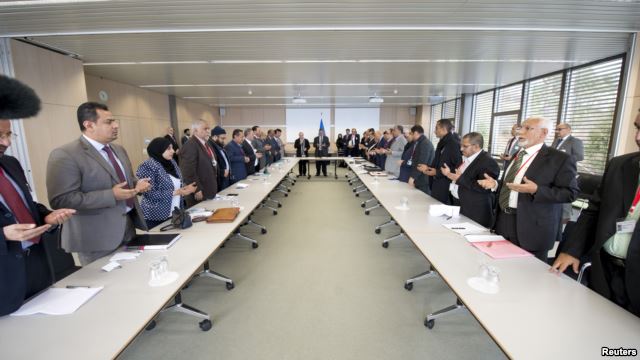Cairo- A meeting session called together on Monday by U.N. Special Envoy to Yemen Ismail Ould Cheikh Ahmed and including four members from each of the government’s delegation and the insurgency delegation (Houthis- followers of the ousted President Ali Abdullah Saleh) was overshadowed by the insurgency’s solid and obstinate stances, reported well-informed political sources present at the Kuwait-held Yemeni peace talks.
Two days ago, the insurgency issued a statement on its new standpoint, revoking all concluded agreements and understandings which were set after 50 days of U.N.-sponsored negotiations.
Sources explained that the insurgency’s standpoints at Monday’s session were extreme and convulsed; They reflected the scale of effect, which Mohammed Abed Al Salam’s trip to the Saada Governorate, had on the delegation stances at the peace talks.
In his visit Salam, insurgency’s delegation chair, met with insurgency leader Abdul-Malik Badreddin al-Houthi. No headway afterwards could be noted at the negotiations.
A source close to the government’s delegation at the negotiations told Asharq Al-Awsat newspaper that the stances reflect the real Houthi intentions, which in turn confirm that their dealing with the negotiations is not serious.
Unlike what news outlets reported, U.N. Special Envoy Ould Cheikh Ahmed has not presented a document or a roadmap, which could lead to a Yemeni solution, at the session.
Leaked information concerning the roadmap, stated that the document will include propositions similar to those made since the kickoff of negotiations; nonetheless the new factor would depend on the way of organizing terms and defining priorities.
Sources added that expected concepts, proposals, and demands are not new at all. The pro-legitimacy government’s delegation urged the necessity of dissolving the so-called Higher Revolutionary Committee, the withdrawal of all resolutions issued by the body, especially decisions taken against the legitimate authority in Yemen.
Sources revealed to Asharq Al-Awsat newspaper scores of political proposals on ending the Yemen war, in addition to information on the current insurgency-spurred situation at the negotiations.
Moreover, the core of political discussions tackled the dilemma facing the Central Bank of Yemen; especially the Yemeni government’s intentions on transferring the bank to another governorate- possibly Aden.
The Central Bank’s predicament was provoked after the insurgency taking over the bank’s reserve which is estimated to be a little over four billion dollars.
What’s more is that the insurgency spent the money over alleged war effort. Militants have also managed to pinch off of the public treasury; appropriating the salaries of government employees and army soldiers.
According to available information, a sort of an agreement is underway between the insurgency and the government delegations at the negotiations.
The potent agreement is on unbiased international parties stressing for the Central Bank being kept uninvolved in the crisis. Noteworthy, insurgency militias had led to the grave loss of the national reserve and the increase in foreign currency – surpassing local currency value—a remarkable rise in the prices of sustenance has also been registered. The current tight spot the Central Bank is caught in threatens a comprehensive economic collapse in Yemen.
U.N. envoy Ould Cheikh Ahmed proposed around two weeks ago forming an independent economic committee which could prevent the economic collapse of Yemen.
